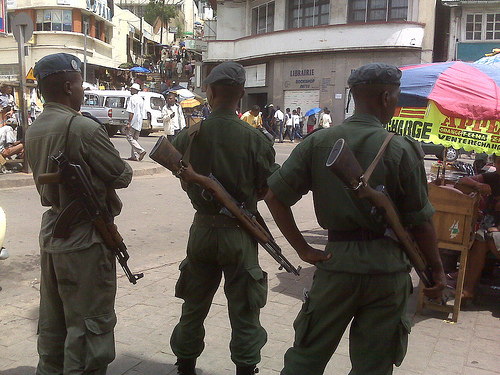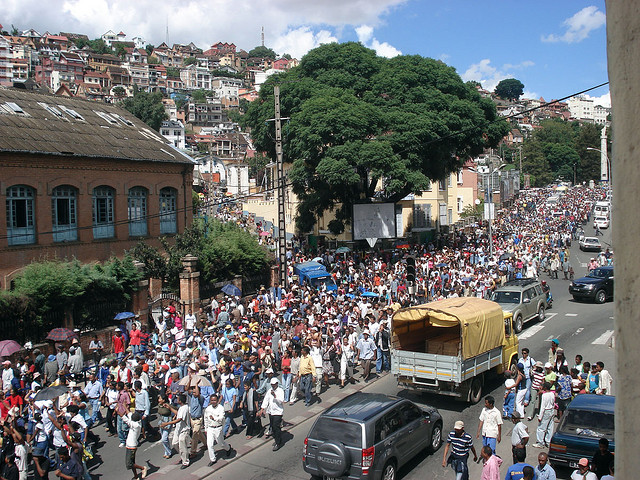
Jeremy Williams explains his concerns about the UK’s arms sales to Madagascar and asks his MP to help get some answers.
Military coup in Madagascar
In March 2009 the Malagasy army seized the president’s palace, ousting the troubled but nonetheless democratically elected president Marc Ravalomanana. He was sent into exile in South Africa, and a new president was installed – a former DJ and the world’s youngest head of state, Andry Rajoelina. It was supposed to be a transition government, but there have not been elections since. They have been announced and then cancelled several times, with the latest attempt scheduled for May 2013.
In response to this coup, the African Union suspended Madagascar’s membership. The EU and many other donors pulled the plug on their aid programmes, and the US dropped its trade agreements with Madagascar under the African Growth and Opportunity Act. On the ground, the transition government signed a series of dubious contracts over the country’s natural resources. Tourism collapsed, and the country’s national parks were plundered for tropical hardwood by smuggling gangs known as the ‘rosewood mafia’.
Insecurity and UK arms sales
A fragile stability has since emerged, but democracy has not yet returned, and the army continues to be unaccountable. Amnesty International has reported on extra-judicial killings by Madagascar’s security forces. The Small Arms Survey for 2011 (PDF) reports that military personnel routinely rent out their weapons to supplement their incomes, and that there is a “complete lack of small arms stockpile management”. A UN investigation (PDF) found evidence of widespread collusion between armed forces and smuggling gangs. “The availability of firearms appears to be rising at an alarming rate”, says the investigation, which heard reports of armed robbery conducted with military weapons, and the presence of private militias on the island.
Despite all of this, exports licensed from Britain to Madagascar in 2012 include assault rifles, combat shotguns, pistols and sniper rifles.
There is very little information about where these weapons are ending up. Some of the recent orders were to a private security firm for ‘anti-piracy’ purposes, but we don’t know who that company is. The destination of the other shipments is unknown. Clearly, Britain should not be supplying an illegitimate regime with weapons, or permitting arms exports that might be used in criminal activity – so who are these weapons going to?
Parliamentary scrutiny
This matter was raised recently at a meeting of the Committees on Arms Export Controls of the House of Commons (see a video, the relevant section starts at 1:48:45). When asked if there was a risk that these ‘anti-piracy’ shipments might end up in the wrong hands, Foreign Secretary William Hague reassured the committee that the companies involved would need to store the weapons in proper arsenals, “usually with the country’s national security organisation”. Since Madagascar’s forces are known to collude in criminal activity and support the undemocratic regime, this is no reassurance at all.
It’s time for Britain to come clean about its arms sales to Madagascar, because there are a whole series of unanswered questions (broken link: http://www.tananews.com/2013/01/concerns-about-uk-arms-exports-to-madagascar/). Why are permits still being granted? Who is receiving the weapons, and what is the relationship between these security firms and the Malagasy government? Are we, as a nation, unwittingly supporting an illegitimate regime?
I grew up in Madagascar. My family moved there when I was five and I returned to Britain when I was 17. It has always been the epitome of the faraway place, like Timbuktu or Outer Mongolia. It is easy for injustices to pass unnoticed there, whether they are committed by corporations, foreign governments, or Madagascar’s own elites and the armed forces they can afford to bribe. But let’s not let this particular injustice go unnoticed, not when we can do something about it.
I’ve written to my MP about Britain’s arms sales to Madagascar. You can read my letter here – please join me and write to your MP too.

r1_lita on flickr
Jeremy blogs at Make Wealth History.

